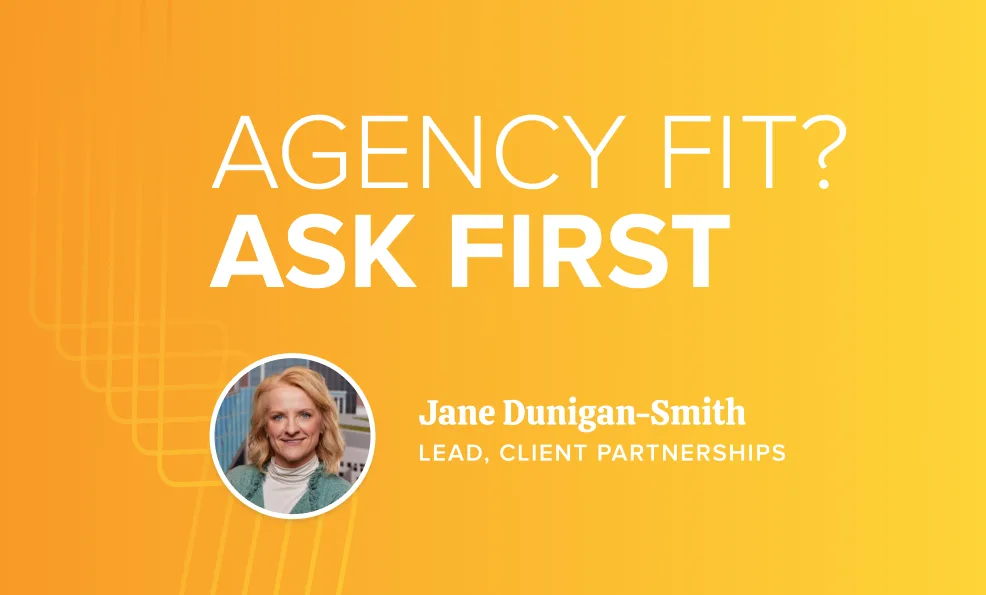What’s your “get work done” routine? Pop in some headphones, turn up the volume and keep your nose to the grindstone . . . or the keyboard? Many of us in a professional setting have a tendency to silo ourselves when we go into “work mode.” Unfortunately, this makes it easy to get stuck in our ways.
In a marketing agency championing open teamwork and a collaborative process, these two approaches can clash. We’re expected to work with each other and our clients, not quiet and alone in a dim corner.
While we’ve been to UX design conferences and content marketing events and held web developer hackathons, we thought a unique educational experience would give our team the opportunity to improve their approach to specialty roles and client service. We always want our team members to generate new ideas on-the-fly, and that meant attending one improv session every week for eight weeks.
Improv? Like, open mic night? That’s what I thought at first, but improv is so much more. See what four of our team members have to say about how the eight-week improv class benefited them.
Brian Puffer, Client Service Director
As professional adults, we’re constantly reminded to be thoughtful and intentional about everything that we say. In improv, when the bright lights are shining on you, thinking before you say or do something on stage is certain death. In a sense, improv rewired me to think like a kid again. Say what comes to mind, be authentic, and the laughs will come.
The same can be said for client service. As marketing consultants, we’re constantly put on the spot, asked tough questions, and given difficult challenges to solve. Improv was a reminder to me that I don’t always have to have the answers on the spot, but, freezing like a deer in stage lights isn’t an option either. On stage, it is sure to ruin the scene, and in a more professional setting, it doesn't instill much confidence that you can get the job done.
Morgan Tiemann, Client Service Director
Improv class was a great reminder that some of the simplest concepts, practiced daily, can vastly help to improve how we communicate with others. These are all familiar concepts, but if we forget to prioritize them, we can miss out on new opportunities and simple solutions. To name a few:
Listening to others is critical for success. And not just waiting for the other person to finish speaking, but really listening to what others are saying.
Always be ready to adapt. We should be ready to pivot quickly (after we’ve listened well) and never let the unexpected new facts or hurdles halt momentum and progress.
Lead with acceptance. We can simplify the process of finding a solution to a problem by first accepting it rather than fighting it right out of the gate. The improv concept of responding with “yes, and…” no matter what scenario presents itself served as a great reminder that if we’re not mindful of our responses, we can inadvertently become our own barrier to success.
Andrew Cruez, Research & Data Specialist
I feel much more comfortable with my ideas and ability to speak to them when I have had time to prepare and fully vet them. This has led to a tendency to scour over research and crunch numbers in preparation for any serious (or even trivial) decision. While this approach lends itself well to my role as Research & Data Specialist, it did me no favors Monday nights at improv class.
Improv is all about how you take in what is happening in the moment and react to it. I learned early on that trying to prepare for any of the exercises was not only pointless, but it also made for an awkward skit or interaction. Over the course of eight weeks, we completed exercises to help us think on the spot, interact with others and build off of one another’s quick responses. The course was a great opportunity to step outside of my comfort zone.
Spencer Dell, VP, Marketing Services
There’s a saying that great things never came from comfort zones, and that couldn’t have been more true from my experience in improv class. The thought of improv was daunting to say the least—not knowing what to expect, who would be there or how I’d fair. But that step into the complete unknown ended up being the best thing for myself and many of us in the class.
Although marketing, and specifically advertising, is often viewed as a highly creative industry, we can often get caught in the rhythm of homogeneous tactics that are safe, trusted and known. Improv reminded me that risks are worth taking in our industry. We should push boundaries and challenge conformity. I’m not talking about taking careless risks simply for risk’s sake but instead embracing the mindset that great ideas are born from uncharted paths, paths that may have included failure or unexpected turns along the way. But these are the paths that dare to define a completely new approach.
Taking risks to step outside of my comfort zone resulted in some of my best memories from improv class. Sure, I flopped and failed in scenes more times than I could count, but continuing to get back up and keep taking risks was the only way to continue growing. As marketers, our best work demands that we cannot lose this hunger for taking risks.

